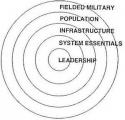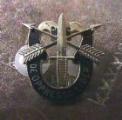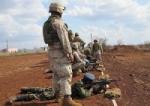I think there are a lot of variables that need to considered, clearly the U.S. and the U.K. were victorious in WWII, but can the same be said about France, the Philippines, China, Burma, Italy, etc.? Countries that were occupied developed resistance groups (during the WWII era most countries developed communist and non-communist resistance groups), which actually led to greater instability after they were victorious in ousting their conquerors. The Afghan resistance victory over the Soviets didn't result in a stable nation with a national identity, and clearly Iraq and Afghanistan won't be stable after we leave them.In other words, states which have been involved in successful interstate wars are much less likely to have major internal, sectional conflicts, whether ones that take the form of insurgency or conventional civil war. (Failed external wars also do not serve the "forging" function, e.g. Iraq and Pakistan).
Japan and Germany were defeated, yet remained relatively stable after WWII?
I think you'll have to explain away so many exceptions that the hypothesis will lose meaning.
Posted by Slapout,
jAmerica,The Civil Rights Movement.
Incorrect, it wasn't a rebellion and it wasn't due to poverty.




 Reply With Quote
Reply With Quote







Bookmarks